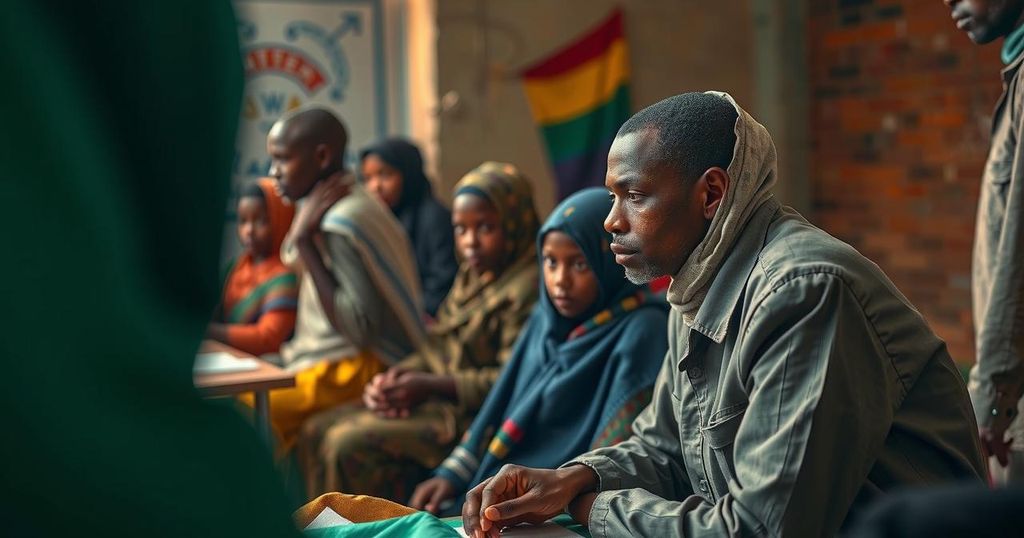Sudan Faces Health Crisis: Cholera and Dengue Fever Surge Amid Ongoing Conflict
Sudan is experiencing a severe health crisis due to ongoing conflict, leading to an alarming rise in cholera and dengue fever cases amidst high hunger levels. Reports from OCHA indicate over 28,000 cholera cases and around 836 deaths, predominantly in Kassala state. The country’s healthcare system is collapsing, with 80 percent of facilities inactive due to violence and supply shortages. Humanitarian agencies are making efforts to provide aid amid this catastrophe, which has uprooted millions and created extreme food insecurity.
Sudan is currently grappling with a catastrophic health crisis exacerbated by ongoing warfare, which has devastated infrastructure and led to widespread starvation. Humanitarian agencies have warned that the healthcare system is on the brink of collapse, coinciding with rising cases of cholera and dengue fever. According to the UN Office for the Coordination of Humanitarian Affairs (OCHA), there have been over 28,000 cholera cases and 836 fatalities in 11 states since late July. The ongoing pandemic has been fueled by heavy rains that contaminated water sources.
The cholera outbreak has heavily impacted the Kassala state, recording 6,868 cases and 198 deaths, while dengue fever has seen a troubling rise in locations like Kassala and Khartoum, where over 4,500 cases have been documented and 12 related deaths have occurred. The Ministry of Health declared a new cholera wave on August 12, prompting an urgent vaccination initiative aimed at reaching approximately 1.4 million individuals in the worst-hit regions.
Amid unemployment and displacement caused by fierce clashes in North Darfur, humanitarian deliveries have been severely hindered, leading to alarming hunger levels surpassing the famine threshold in certain areas. Médecins Sans Frontières (MSF) has expressed concerns regarding acute malnutrition rates, which remain significantly high in the Zamzam internally displaced persons camp due to blocked aid supplies. Although famines were confirmed in this camp in August, the precarious situation is compounded by continued hostilities that are driving civilians away in search of safety and assistance.
Compounding these challenges, as much as 80 percent of health facilities have been rendered inoperable in conflict-stricken zones, according to the World Health Organization (WHO). The attack on healthcare facilities is alarmingly common, with 116 incidents leading to numerous casualties among medical personnel and patients, undermining child vaccination initiatives and heightening the risk of disease outbreaks.
Despite this harrowing crisis which has displaced over 11 million people within Sudan and forced nearly three million to flee, humanitarian organizations are striving to reach approximately 12.6 million individuals with essential aid and services.
The healthcare situation in Sudan has reached a dire state due to the escalating conflicts between rival military factions—the Sudanese Armed Forces (SAF) and the Rapid Support Forces (RSF). The war, which escalated in April 2023, has led to widespread displacement, destruction of critical infrastructure, and an overall collapse of the healthcare system. As facilities shut down and humanitarian access is obstructed, diseases such as cholera and dengue fever have surged, posing urgent challenges to public health and safety. The United Nations and various NGOs are mobilizing efforts to provide assistance amid these compounding crises, focusing on both disease control and hunger alleviation.
As Sudan faces a multi-faceted humanitarian crisis characterized by rising rates of cholera and dengue fever amidst relentless warfare, the urgent need for humanitarian intervention becomes increasingly clear. With reports of overwhelming malnutrition and a crumbling healthcare system, the international community’s response will be critical in averting widespread famine and health disasters. Efforts such as vaccination campaigns and food aid are imperative to restore some semblance of stability for those affected by this tragic situation.
Original Source: news.un.org




Post Comment